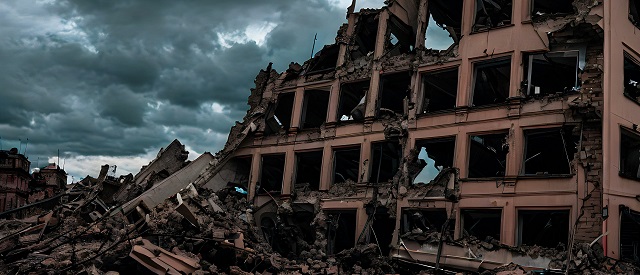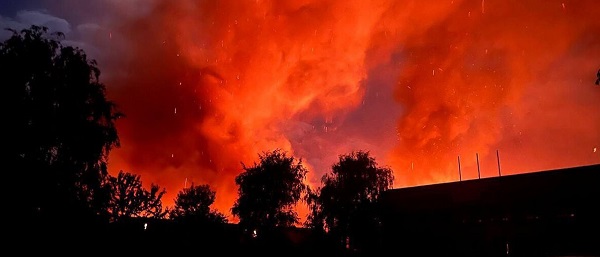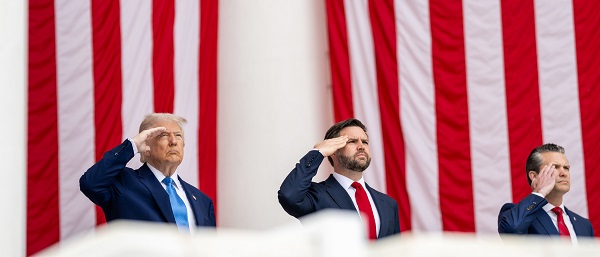conflict
White House Reportedly Worried About Russia’s Sudden Momentum Months After Biden Declared Putin ‘Already Lost’ War

 From the Daily Caller News Foundation
From the Daily Caller News Foundation
By NICK POPE
Manpower is a factor of growing significance for the Ukrainians, according to numerous reports. The war has claimed the lives of tens of thousands of Ukrainian soldiers, according to The Associated Press
White House officials are reportedly concerned that Russia may soon change the course of the conflict in Ukraine, less than a year after President Joe Biden said Russian President Vladimir Putin “already lost” the war, The New York Times reported Wednedsay.
Some aides and officials inside the Biden administration are concerned that Russia may be turning the war’s tide despite the U.S. government’s April approval of $61 billion of fresh aid for Ukraine, according to the NYT. The current level of concern stands in contrast to Biden’s comments in July 2023 that Putin had “already lost the war” and that there is “no possibility” the Russians prevail in the conflict.
“Putin’s already lost the war,” Biden said during a July 2023 press conference alongside then-Finnish President Sauli Niinisto. “Putin has a real problem. How does he move from here? What does he do? And so, the idea that there’s going to be, what vehicle is used, he could end the war tomorrow, he could just say ‘I’m out.’ But what agreement is ultimately reached depends upon Putin and what he decides to do, but there is no possibility of him winning the war in Ukraine.”
Sec Blinken announces another $2 Billion in aid to Ukraine pic.twitter.com/PLZ5Ylrjko
— Daily Caller (@DailyCaller) May 15, 2024
Eighteen months ago, Biden administration personnel debated among themselves whether or not Ukraine could fully expel the Russians from their territory, according to the Times. Now, a number of officials and aides are reportedly viewing the next few months as critical toward determining the conclusion of the conflict, whether that takes the shape of a negotiated cease-fire deal or some other resolution.
Russian forces captured a considerable amount of territory near Kharkiv in Ukraine’s northeast over the weekend, and the Ukrainian command has been forced to divert some of their own forces to the region, leaving other parts of the front less well-manned. Recent gains in the Kharkiv region represented the most mileage that the Russians have captured in a short period of time over the course of the whole war, excluding its earliest stages.
Notably, manpower is a factor of growing significance for the Ukrainians, according to numerous reports. The war has claimed the lives of tens of thousands of Ukrainian soldiers, according to The Associated Press, and the Ukrainian government has lowered the minimum age of conscription from 27 to 25 and started to send certain types of convicts to the front lines.
Ukrainian forces have also reportedly struggled to quickly train enough pilots to operate costly and sophisticated F-16 fighter jets provided by the U.S. Another issue on the front lines is that Russian forces have learned to use electronic techniques to counter drone and artillery systems provided to Ukraine by the West, according to the Times.
The Department of Defense (DOD) also believes that congress’ delays in authorizing the $61 billion package has contributed to the current situation on the front lines, a DOD spokesperson told the Daily Caller News Foundation. However, there is hope that the situation will improve as weapons covered by the aid package approved in April begin to arrive at the front lines en masse, with U.S. officials currently expecting that the weapons will begin to make a real difference in July, according to the Times.
“On Friday, we warned that we had been anticipating that Russia would launch an offensive against Kharkiv and were anticipating that Russia would increase its attacks in an attempt to establish a shallow buffer zone along the Ukrainian border – and we have been coordinating closely with Ukraine to help them prepare,” the DOD spokesperson told the DCNF. “As we have said previously, Congress’ months-long delay in passing the supplemental put the Russians at an advantage, and it will take Ukraine time to regain the initiative. It is possible that Russia will make further advances in the coming weeks, but over time, the influx of U.S. assistance will enable Ukraine to withstand these attacks over the course of 2024.”
The DOD is “moving heaven and earth” to get weapons to the Ukrainians as soon as possible, and the agency is also preparing a new aid package to assist Ukrainian forces, the spokesperson added. Since the war started in February 2022, the U.S. alone has spent more than $100 billion to support the Ukrainian war effort, according to the Council on Foreign Relations.
The White House did not respond immediately to a request for comment.
Artificial Intelligence
AI Drone ‘Swarms’ Unleashed On Ukraine Battlefields, Marking New Era Of Warfare


From the Daily Caller News Foundation
Artificial intelligence-powered drones are making their first appearances on the battlefield in the Russia-Ukraine war as warfare creeps closer to full automation.
In bombardments on Russian targets in the past year, Ukrainian drones acting in concert were able to independently determine where to strike without human input.
It’s the first battlefield use of AI “swarm” technology in a real-world environment, a senior Ukrainian official and Swarmer, the company who makes the software, told the Wall Street Journal in a Tuesday report. While drones have increasingly defined modern battlefields, swarms until now had been confined to testing rather than combat.
“You set the target and the drones do the rest,” Swarmer Chief Executive Serhii Kupriienko told the WSJ. “They work together, they adapt.”
So far, the Swarmer technology has been used hundreds of times to target Russia assets, but was first used a year ago to lay mines on the front, the Ukrainian official told the WSJ. The software has been tested with up to 25 drones at once, but is usually utilized with only three.
Kupriienko told the WSJ that he was preparing to test up to 100 drones at once with the linking software.
A common arrangement used on the battlefield includes one reconnaissance drone to scout out the target and two explosive drones delivering the payload on target, the official told the WSJ.
While Western nations such as the U.S., France and the United Kingdom are also pursuing drone swarm technology, they have not deployed swarm technology on the battlefield the way Ukraine has, according to the WSJ. Currently, autonomous weapons are not regulated by any international authority or binding agreement, but ethical concerns around the technology has led many to call for increased regulation of weapons like the Swarmer system.
The Ukrainian Ministry of Foreign Affairs did not immediately respond to the Daily Caller News Foundation’s request for comment.
conflict
Trump Pentagon Reportedly Blocking Ukraine From Firing Western Missiles Deep Into Russia


From the Daily Caller News Foundation
The Department of Defense has spent months blocking the Ukrainian military from using American and British-made missiles to hit targets deep inside Russia, The Wall Street Journal reported Sunday, citing unnamed U.S. officials.
Undersecretary of Defense for Policy Eldridge Colby reportedly designed the procedure to review requests to carry out the long-range strikes with weapons that are either of U.S. origin or that require American intelligence or use components provided by the U.S., according to the WSJ. Secretary of Defense Pete Hegseth reportedly has the final say on whether Ukrainian forces can use the MGM-140 ATACMS (Army Tactical Missile System) to hit targets in Russia.
The reported blocks on missile strikes coincides with a Trump administration effort to broker a peace deal between Russia and Ukraine. A Pentagon spokesperson declined to comment further on the matter.
BREAKING: President Vladimir Putin reacts to B-2 Flyover pic.twitter.com/1mzVn7DxlW
— Jack Poso 🇺🇸 (@JackPosobiec) August 15, 2025
The Biden administration allowed Ukraine to carry out strikes with ATACMS in November, weeks after President Donald Trump won the 2024 election, the New York Times reported. Trump criticized the move during a December interview with Time magazine.
“It’s crazy what’s taking place. It’s crazy,” Trump said. “I disagree very vehemently with sending missiles hundreds of miles into Russia. Why are we doing that? We’re just escalating this war and making it worse. That should not have been allowed to be done.”
Trump and Russian President Vladimir Putin met in Alaska on Aug. 15 for a summit meeting during which Trump sought to secure a cease-fire in Russia’s war with Ukraine. As Trump greeted Putin, a B-2A Spirit stealth bomber and several fighters carried out a flyover of Elmendorf Air Force Base.
Trump met with Ukrainian President Volodymyr Zelensky and major European leaders on Aug. 18 to update them on the summit.
In July, Trump reached an agreement with NATO where members of the alliance would purchase weapons, including MIM-104 Patriot surface-to-air missiles, and donate them to Ukraine.
-

 Daily Caller1 day ago
Daily Caller1 day ago‘Holy Sh*t!’: Podcaster Aghast As Charlie Kirk’s Security Leader Reads Texts He Allegedly Sent University Police
-

 Alberta2 days ago
Alberta2 days agoAlberta Offers Enormous Advantages for AI Data Centres
-

 Great Reset1 day ago
Great Reset1 day agoCanadian government forcing doctors to promote euthanasia to patients: report
-

 Carbon Tax1 day ago
Carbon Tax1 day agoCarney fails to undo Trudeau’s devastating energy policies
-

 Alberta2 days ago
Alberta2 days agoNational Crisis Approaching Due To The Carney Government’s Centrally Planned Green Economy
-

 Alberta2 days ago
Alberta2 days agoCalgary mayor should retain ‘blanket rezoning’ for sake of Calgarian families
-

 Health1 day ago
Health1 day agoNEW STUDY: Infant Vaccine “Intensity” Strongly Predicts Autism Rates Worldwide
-

 Alberta1 day ago
Alberta1 day agoSylvan Lake football coach fired for opposing transgender ideology elected to town council



